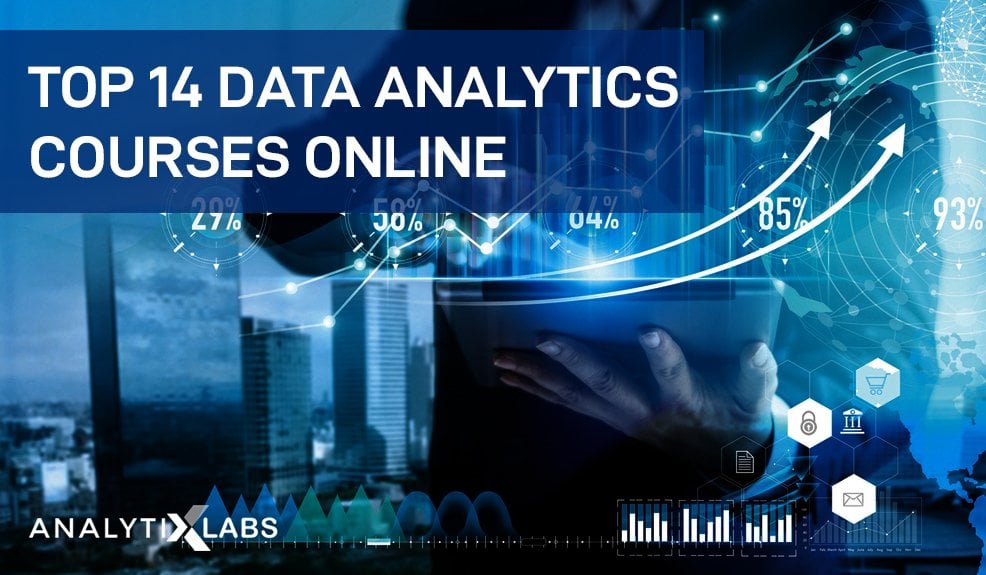Introduction to Data Analytics
Data Analysis and its domains are growing at an astronomical rate, not only in academic realms but also in the corporate world. Many professionals are switching from general engineering job roles towards the goldmine of analyzing data for different companies and firms. In recent years, data science and machine learning have become buzzwords in technology and science. The amount of data that is generated and collected online continues to rise. This data helps in making business decisions efficiently and swiftly. Therefore, every modern business of this era is inclined in data-driven methods to extract most data analytics.
According to the predictions of IBM, the number of data professional jobs will rise from 364,000 to 2,720,000 in the United States by 2020. Today almost every business is data-driven. To become a data analytics expert, this article will give you a list of the top online data analytics courses.
What is Data Analytics?
Data Analytics is the methodology used to analyze raw data, extract some meaning and trend, find answers to questions, and understand the future requirements of a process. Data analytics captures a broader range of domains and acts as an interdisciplinary tool for analyzing data.
Related: What is Data Analytics? Career Guide – Evolution, Stages, Jobs & Skills
It encompasses multiple techniques meant for different goals and purposes. Some key components like types of data, the objective of analyzing the data, etc., are essential in data analytics.
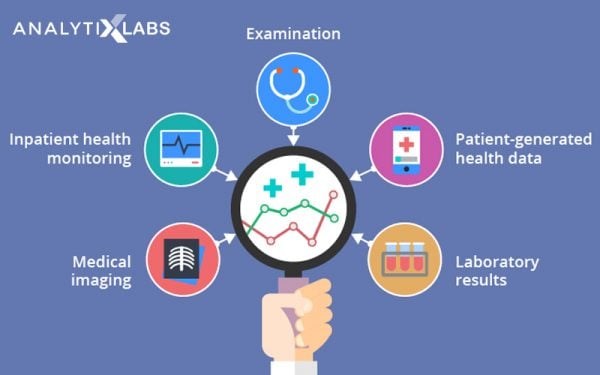
Importance of Pursuing a Data Analytics Course
Many have realized the significance of Big Data as a powerful reference to gain insights and make effective decisions. Thus, the demand for data analytics specialists is also growing in the job market. Pursuing a data analytics course will help you grab lucrative work opportunities. A career in data analytics is one of the most promising options available during this fast-pacing 21st century. The same thing is reflected in the graph below.
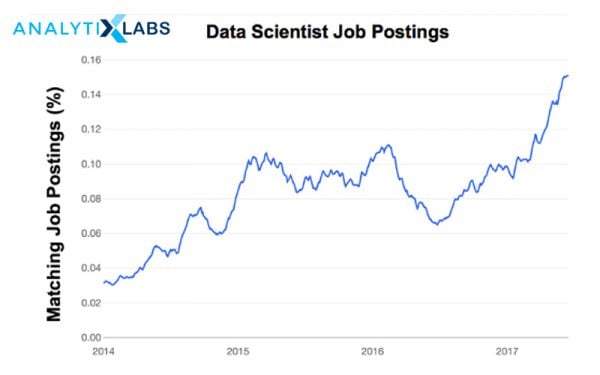
It is very important to choose the right course from numerous online and offline data analysis courses. Data analysis is a broad domain. Therefore, understanding the significance of different specialized data analytics courses is necessary. In this article, you will learn about the best data analytics courses that are available online. This article will also include some best data analytics courses for beginners.
Top Data Analysis Courses
It does not matter whether or not you have any prior knowledge of or experience in data analytics. These courses listed below will help you kickstart your learning in a better way.
- Data Analytics for Lean Six Sigma
- Nanodegree in Data analyst
- Analytics Edge
- Introduction to Data Analytics for Business
- Business Analytics 360
- Data Analysis with R
- Beginner Statistics for Data Analytics- Learn the Easy Way
- Data Analytics Literacy
- Pandas and Scikit-learn For Data Analysis & Machine Learning
- Advanced Business Analytics Specialization
- R Level 1- Data Analytics with R
- Health Information Literacy for Data Analytics Specialization
- AWS Certified Data Analytics– Specialty
- Data Analytics- SQL for newbs, beginners, and marketers
Let us now dig deep into these courses one by one.
1. Data Analytics for Lean Six Sigma:
It is one of the most popular online best data analytics courses for beginners as well as professionals. Lean Six Sigma is the specialization of this course. It is a process that qualifies the collaborative managerial effort in a team. This method improves performance by decreasing disparity and orderly, removing waste from a system.
The Data Analytics for Lean Six Sigma course provides all the necessary details on various data analytic techniques for enhancing projects with Lean Six Sigma. After completing this course, students will be able to analyze and evaluate data obtained from a Six Sigma remodelling project.
The course duration is 15 hours and is led by Dr. Inez Zwetsloot. She is an academic researcher and business consultant by profession. The course is offered by the University of Amsterdam in collaboration with Coursera.
The topics to be covered in this course are:
- Data and DMAIC
- Descriptive statistics
- Hypothesis testing and Causality
- Introduction to ANOVA
- Introduction to data analytics for lean six sigma
- Introduction to lean six sigma
- Introduction to Minitab: installing and loading data
- Kruskal-Wallis test
- Normal, lognormal, and Weibull distribution
- Organizing data
- Pareto analysis
- Population vs. sampling
- Probability plot and empirical CDF
- Selecting CTQs
- Visualizing numerical and categorical data
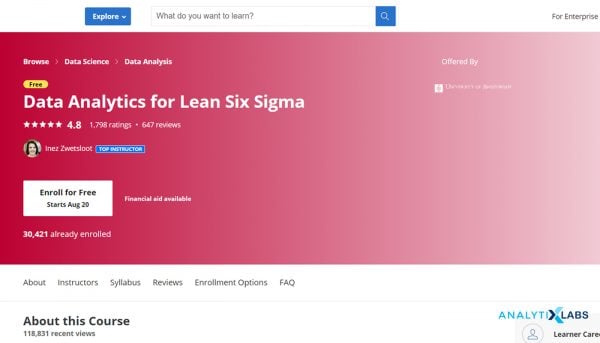
2. Nano Degree in Data Analyst
This online course will prepare individuals to start their careers as data analysts. Here you will learn to organize data in a meaningful manner, reveal patterns for business insights, draw insightful conclusions and clearly articulate critical findings.
The syllabus for the entire course is available here. This Nanodegree program is available on Udacity. It is led by 7 instructors who are renowned data analysts, data scientists, and product leads. The four major sections of this course are:
– Introduction to Data Analysis
– Practical Statistics
– Data Wrangling
– Data Visualization with Python
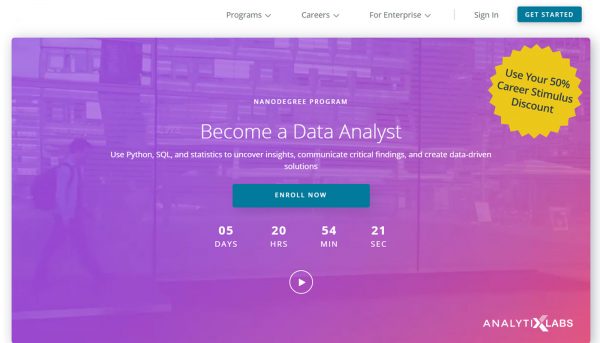
3. Business Analyst Course – Analytics Edge:
The demand for business analytics and business intelligence courses is tremendous. As data analysis has become an indispensable component, this business analyst course provided by AnalytixLabs can guide you in learning Data Mining, Statistical & Predictive Modelling skills using the in-demand analytics tools. The course is designed for professionals targeting analytics jobs with hands-on learning on R, Excel-VBA, SQL, and Tableau.
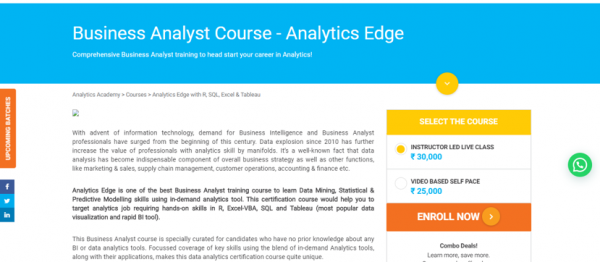
This course trains the candidates from the beginning, and hence no prior knowledge about any BI or data analytics tools is required. Beginners and professionals from various quantitative backgrounds, like Engineering, Maths, Finance, Business Management, etc. can opt for this course. The course duration is 450 hours and provides two approaches to learn – instructor-led live classes, which cost Rs. 30,000, and the self-pace video costs Rs. 25,000.
4. Introduction to Data Analytics for Business:
This is one of the best courses in data analytics. This online data analytics course, available on Coursera, is for intermediate-level students and professionals. The course is conducted in collaboration with the University of Colorado Boulder.
It educates learners regarding numerous data analytics practices for business management and developing insights for business. This popular course in data analytics fluently takes you through the development of the analytical process, creation of data, storage mechanism, data accessing approaches, and how firms and enterprises deal with data. It also includes advanced investigative and computational methods.
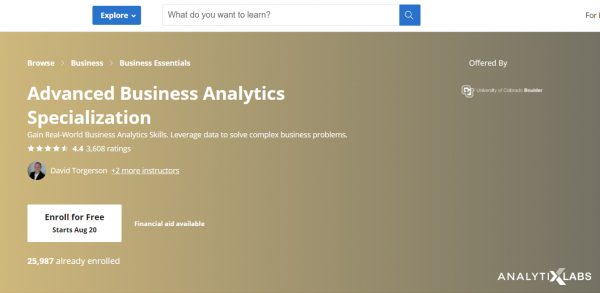
The course is for four weeks, and course-takers are expected to work five hours a week.
This is one of the most useful data analytics courses for those who want a good foundation for their career and want to understand data analysis for business. The course is led by Mr. David Torgerson, who is a guest lecturer and instructor at the University of Colorado, Boulder.
5. Business Analytics 360 – By AnalytixLabs:
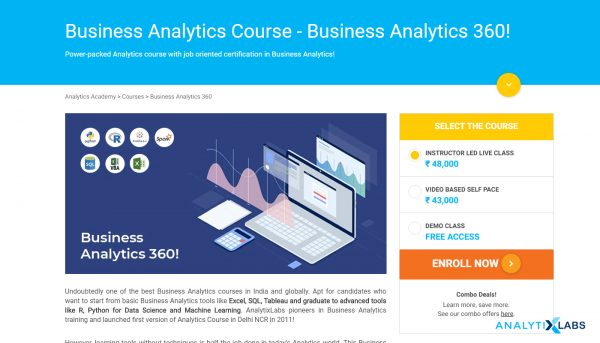
It is one of the most popular Business Analytics courses by Analytixlabs on business analytics. It is one of the best business analytics courses, covering tools and concepts like Excel, SQL, Tableau, and graduate to advanced tools like R, Python for Data Science, and Machine Learning. This course trains the candidates from the beginning. Hence, this course has been designed and curated for candidates looking for job-oriented business analytics certification; without prior knowledge of any business intelligence or data analytics skills. The course duration is 450 hours and provides two approaches to learn – instructor-led live classes, which cost Rs. 42,000, and the self-paced video costs Rs. 35,000.
6. Data Analysis With R:
This is a very lucrative data analysis course online and is available on Udacity. It is offered by Facebook. This intermediate-level sub-course is for enthusiastic R language learners who want to implement R in data analysis.
It focuses specifically on the R programming language for analyzing data. This online data analytics course structure is designed mainly to summarize and visualize the essential components of a data set.
The course focuses on exploratory data analysis. This concept emphasises comprehending the data’s underlying structure and sense. The course will also make students develop an intuition about what the data set wants to convey and its origins and decide how to investigate them with numerous conventional statistical methods.
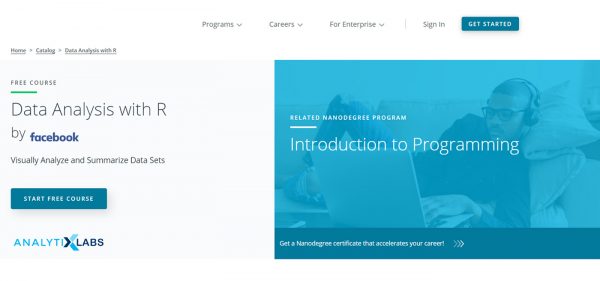
This course is a distinct part of the Data analysis Nanodegree program. However, it can be taken on its own for free. Moira Burke, Chris Saden, Solomon Messing, and Dean Eckles are the experienced instructors who lead this course. A primary knowledge of statistics will be advantageous for this course but is not required.
The chapters covered in this course are:What is Exploratory Data Analysis (EDA)?
– Basics of R Language
– Explore One Variable: Practically performing EDA
– Explore Two Variables
– Explore Many Variables
– Diamond and Price Predictions
– Final Project
7. Beginner Statistics for Data Analytics:
If you do not have any prior knowledge in statistics and data analysis but are amazed and fascinated by the field, this course is for you. This is one of the best data analytics courses online on Udemy. It imparts the basic knowledge of statistics and regression analysis. Students who enrol in this course can learn and understand these concepts quickly and interestingly.
There is no prerequisite requirement for this course, although knowledge of any version of Excel is preferred. It has 3 hours of on-demand video recordings that will teach students the fundamental statistical tools necessary for becoming successful data analysts.
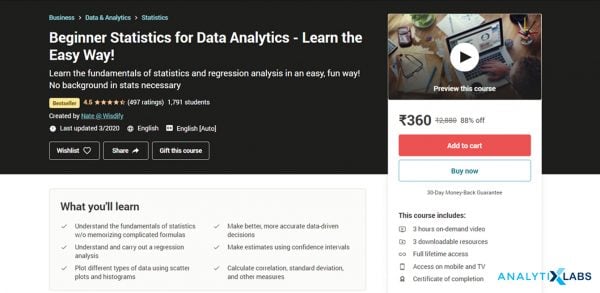
The course is accessible via mobile, laptop, and TV. The course has 42 impactful lectures. After the completion of this course, the students will be able to make various data-driven decisions accurately and efficiently. The course instructor, Mr. Nate, is the Co-founder and lead instructor at Wisdify.
The chapters covered in this course are:
- Introduction to the course
- The Fundamentals of Statistics
- A Deeper Dive into Descriptive Statistics
- Inferential Statistics & Estimates
- Introduction to Regression Analysis
- Creating and Understanding Regression
- Conclusion
8. Data Analytics Literacy:
Pluralsight is one of the popular e-learning platforms that provide excellent courses in different domains. The Data Analytics Literacy course is an on-demand package of seventeen hours. It is designed for professionals who want to extend their careers in the field of data analytics.
This intermediate-level course covers topics like general analytics workflow, differentiation of data types, identification of suitable analyses, application of hypothetical tests for new business problems, etc.
Various RDBMS concepts, architectures, and Online Transactional Processing (OLTP) systems for writing portable SQL queries against data-defined schemas are explained accurately in this course.
It also covers common database programming constructs, understanding components of NoSQL databases for data analytics, modelling and writing analytical queries, and differentiating between columnar/wide-column databases versus document databases.
This course also focuses on Big Data. Furthermore, this course also talks about cloud versus on-premise resolutions used for data management by data analysts and the various cloud services used for general data analytics workflow.
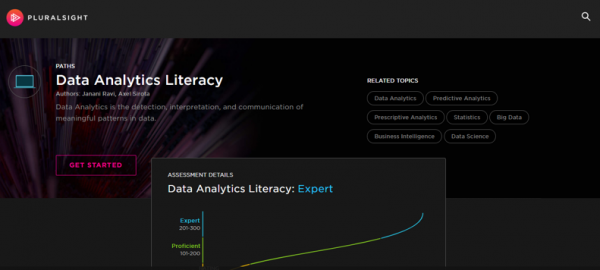
The Data Analytics Literacy course includes various business problems, differentiation between tabular versus cube data models, writing analytical queries, working with nested/repeated data, methods for getting data in & out of systems (including speciality languages such as Pig), bulk loading, streaming inserts, etc.
The authors for this course are Janani Ravi, Axel Sirota. They are expert data analysts and instructors.
9. Pandas and Scikit:
Learn for Data Analysis For Machine Learning: Another popular data analysis course is designed flexibly for beginners and intermediate-level professionals. This course is one of the best sellers at Udemy. It can directly start your career in the lucrative world of data analytics by teaching you the use of libraries like Pandas and Scikit-learn. This course will also pull you through the basics of Python. If you are new to this field, it will instruct you on the concepts of data visualization using Matplotlib and Seaborn Library.
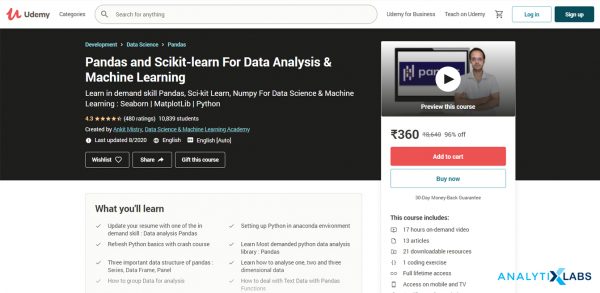
This course has 31 sections containing 149 lectures. This course is seventeen hours of on-demand video lectures and will be available lifelong with your Udemy account access.
The primary requirement of this course is to have a Windows, Linux, or MAC system and a basic idea about programming concepts. This course will give learners a strong foundation of data analysis and help them build a robust perception of working with various popular data science libraries. Lastly, the course will give you a basic understanding of machine learning as well.
Ankit Mistry, the course instructor, is a Master’s degree holder from IIT Kharagpur and a professional software developer.
10. Advanced Business Analytics Specialization:
The “Advanced Business Analytics Specialization” course is one of the significant data analytics courses available online. It aims to strengthen practical business analytics skills and insights. Since it is an advanced-level course, it is mandatory to have prior experience with data analytics.
This course takes nearly four months to finish if one invests six hours a week. This course expressly focuses on data visualization, Structured Query Language for data analysts, and mathematical optimization methods. This specialization course is available on Coursera (offered by the University of Colorado Boulder). The instructors for this course are David Torgerson, Manuel Laguna, and Dan Zhang.
The course will cover sub-course and topics like:
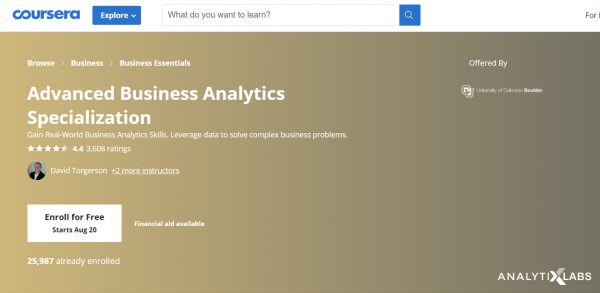
- Introduction to Data Analytics for Business (Course 1)
- Predictive Modeling and Analytics (Course 2)
- Business Analytics for Decision Making (Course 3)
- Communicating Business Analytics Results (Course 4)
- Advanced Business Analytics Capstone (Course 5)
11. R Level 1 – Data Analytics with R:
There are many reasons to use the R language for data analytics rather than Python. The main reasons are security management and robust infrastructure. This best data analytics courses for beginners is meant to help learners study and pick up the pace with understanding R programming for achieving various kinds of data analytics tasks.
This course covers general types of graphs produced with R base, understanding functions and loops in R, creating and handling various types of objects, etc. Knowledge of statistical programming and data structure is recommended for a better understanding of this course.
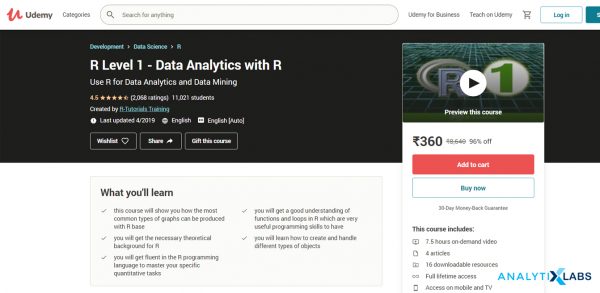
This course has 9 sections containing 87 lectures. It provides 9 hours (approx.) of on-demand video lectures that would have lifelong availability with your Udemy account access.
The topics covered in this course are:
- Creating objects in R
- Data types in R
- Functions for R
- Graphs for data analytics
- Practical implementation of R programming language
- Looping
- Using the R Commander GUI
- Working with strings
12. Health Information Literacy for Data Analytics Specialization:
The healthcare industry also understands the significance of data analysis and its predicting capabilities. This course is one of the leading online data analytics courses that focus on data professionals that are seeking to make a career switch with no previous healthcare industry experience. At least two years of prior experience as a data analyst or technology professional is mandatory to apply for this course.
Coursera offers flexibility in completing this course. With 4 hours of learning per week, a learner will be able to complete this advanced specialization course in just four months.
It is one of the best data analytics courses online. It will help data analytics professionals develop skill sets for the healthcare vertical. This intermediate-level course will guide learners on how to acquire various forms of healthcare data from different sources. At the end of this course, a hands-on project will allow you to reap the maximum benefits from this course.
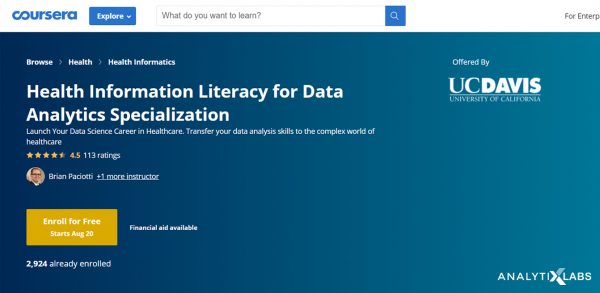
The instructors for this course are Brian Paciotti and Doug Berman. Brian Paciotti is a healthcare data scientist, and Doug Berman is a data acquisition and architect-engineer at UC Davis Health System.
The topics and sub-courses covered in this online data analytics course are:
- Healthcare Data Literacy (Course 1)
- Healthcare Data Models (Course 2)
- Healthcare Data Quality and Governance (Course 3)
- Analytical Solutions to Common Healthcare Problems (Course 4)
13. AWS Certified Data Analytics – Specialty:
Cloud computing is the wave of the future. It is altering the way people use the data highway. This course is a specialized domain of the data analytics course which focuses on cloud-based data analysis. This advanced-level self-paced course will benefit aspirants who are interested in giving the AWS Certified Data Analytics Specialty certification exam.
The course is designed to teach the learners how to assess all the possible business requirements for big data applications and cloud-related data. Learners can then formulate the knowledge to build, secure, maintain, and design data analytics solutions for the AWS cloud. The course path is meant for advanced AWS practitioners. A minimum of two years of experience with AWS and five years of experience in the data analytics field is necessary.

Along with these, the AWS Certified Solution Architect– Associate certification or the AWS Certified Developer– Associate certification is recommended before this course. The course authors are Fernando Medina Corey, Mohammed Osman, and Saravanan Dhandapani.
The sub-courses and topics of this course are:
- Collecting data on AWS
- Processing data on AWS
- Analyzing data on AWS
- Visualizing data on AWS
- Securing data analytics pipelines on AWS
14. Data Analytics – SQL for Beginners and Marketers:
This is one of the best basic data analytics courses for beginners on Udemy. It is a beginner-friendly course and is meant for enthusiasts who want to jumpstart their career in the field of data analytics.
This course guides the learners on how to use Structured Query Language (SQL) to handle and analyze data and solve market-based problems. This course also provides a clear yet brief glimpse of SQL using Spark and helps learners create a Spark cluster on AWS EC2. The entire course is delivered within 10 sections, containing 30 lectures in total. The total time span of this course is approximately 2 hours.
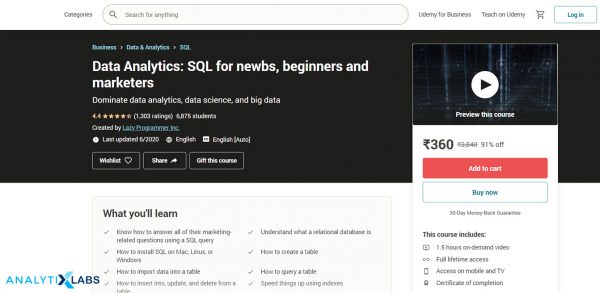
Topics covered in this course are:
- Relational Database
- Indexes and speed comparison
- Modifying and joining the table’s data and
- Aggregating, grouping, and sorting
- Basic SQL commands
- Basics of SQL
- Importing data on Windows
- Increasing speed using indexes
- Installing SQLite on Linux, macOS, and Windows platforms
- Joining and merging tables
- Overview of SQL databases
- Advanced SQL on Spark
- Practices and exercises
Frequently Asked Questions
1. What are the Best Data Analytics Courses?
Other than these courses, you can check out offline and online collection of job-oriented data analytics courses on AnalytixLabs. Learners can browse from a list of courses on this site. A data analysis course becomes useful when it includes well-explained statistical concepts, data analysis theories, concepts, and multi-modal data communication methodologies. Moreover, it should encourage creativity and provide a practical implementation for analyzing real-world data.
2. How do I Become a Data Analyst?
An undergraduate degree– irrespective of any stream, is essential to become a data analyst. Here is a list of steps that will help you pursue a career as a data analyst if you are enthusiastic about becoming a data analyst.
- Obtain a bachelor’s degree in a related field with an added focus on statistical, logical, and analytical skills.
- Learn essential data analytics skills (either online or offline).
- Earn certification or certificates related to data science. They are highly acknowledged.
- Make projects and real-life data analysis for understanding the role of a data analyst better.
- Get an internship or entry-level job in this field for on-demand practical market exposure.
3. How can I Learn Data Analytics Online?
There are various learning paths you will find online (both free and paid). Some are written study material, while others are video and multimedia. This article has listed some of the top data analytics courses available online. You can opt for some of these. At the same time, use free written content for reference. Another point you must keep in mind is to focus on one particular programming language (Python or R) for better understanding and implementation. Understanding business and big data side-by-side is also crucial for professionals analyzing data.
4. Is Data Analytics a Good Career?
Yes, it is a good career. The need for data analysts is increasing and will prevail throughout the future. The demand for this job role is tremendous, yet, the availability of such professionals is limited. As a result, great job opportunities are available in this field.
Related: Data Analyst vs Business Analyst – Which is for you?
5. What is the Qualification for a Data Analyst?
As mentioned earlier, a bachelor’s degree is essential to become a data analyst. A bachelor’s degree is suitable for an entry-level job. For getting a promotion or higher-level job in this domain, a master’s degree or global certification is required.
6. Who can Become a Data Analyst?
- Individuals passionate about data analysis.
- Students with good math and statistical knowledge/ interest can opt for a career in data analytics.
- Tech graduates with enthusiasm for data science can also start their career as a data analyst.
- Graduates from other quant domains can also opt for this career provided they have the eagerness to crunch data and put initial effort requred to learn the reqiored skills.
7. What are the Required Skills for Data Analytics?
The standard data analytical skills required for a better career role are:
- Analytical skills
- Numerical skills
- Basic Technical / Computer skills
- Data handling skills
- Attention to detailing
- Understanding of business and domain
- Soft (Communication and interaction) skills
Related: A career as a Business Analyst in India – Complete Guide
8. What is the Salary of a Data Analyst in India?
The average salary of a data analyst in India ranges from ₹30,000 to ₹60,000 per month.
9. Does Data Analytics Require Coding?
Yes, Data Analysts need to know some basic coding skills. They aren’t required to have advanced coding skills, and most of the time, even non-technical candidates are able to excel with the required level of coding skills. However, it is necessary to have expertise in analytics and data visualization tools.
10. What are Data Analytics Tools?
There are numerous data analytics tools available in the industry. From jobs demand point of view one may focus on the following tools:
- MS Excel
- SQL
- Tableau
- R
- Python
You may also like to read:

